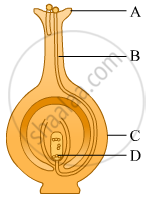Advertisements
Advertisements
प्रश्न
Find an odd one out.
विकल्प
Hibiscus
Papaya
Sun-flower
Rose
Mango
उत्तर
Papaya
APPEARS IN
संबंधित प्रश्न
Match the following:
| Column A | Column B |
| (i) Stigma | (a) Neuron |
| (ii) Pepsin | (b) Carpel |
| (iii) Dendrites | (c) Protein |
| (d) Stamen |
A student was asked to observe and identify the various parts of an embryo of a red kidney bean seed. He identified the parts and listed them as under:
I. Tegmen
II. Testa
III. Cotyledon
IV. Radicle
V. Plumule
The correctly identified parts among these are
(A) I, II and III
(B) II, III and IV
(C) III, IV and V
(D) I, III, IV and V
Mention the changes a flower undergoes after fertilisation.
The fusion of male and female gametes is termed as ______.
Name the part made up of the stigma, style and ovary.
Where is the male gamete formed in flowering plants?
Fill in the following blank with suitable word :
The term used to refer to the transfer of pollen from the stamen of one flower to the carpel of another flower of the same species is...........
How is the process of pollination different from fertilization?
Name the part of a seed which grows into shoot.
What changes take place in the flower after fertilisation which lead to the formation of seeds and fruit?
Which of the following statements are true for flowers?
(i) Flowers are always bisexual.
(ii) They contain sexual reproductive organs.
(iii) They are produced in all groups of plants.
(iv) after fertilization they give rise to fruits.
State whether the following statement is true (T) or false (F):
Stamens make egg cells.
Find the odd-one out, giving reason:
Anther, pollen grain, ovule male gamete
Identify A, B, C and D in the given diagram and write their names.
Explain the process of fertilisation in flowers.
In the figure, the parts marked A, B and C are sequentially:

(A) Plumule, Radicle and Cotyledon
(B) Radicle, Plumule and Cotyledon
(C) Plumule, Cotyledon and Radicle
(D) Radicle, Cotyledon and Plumule
Distinguish between unisexual and bisexual flowers giving one example of each. Draw a diagram showing process of germination of pollen grains on stigma and label the following parts:
(a) Female germ cell
(b) Male germ cell
(c) Ovary
Prepare a slogan for campaign against female foeticide.
What is meant by pollination?
Find the odd one out:
Define.
Inflorescence
Explain the sexual reproduction process in plants with a diagram.
Observe the figure below. Write functions of the labelled parts.

The 3-celled egg apparatus at the micropylar end comprises of ______
Sperm and egg nuclei fuse due to ______.
In a flowering plant, archesporium gives rise to ______.
Pineapple fruit develops from ______.
Conidia are formed endogenously while zoospores are formed endogenously.
The flower of the Hibiscus plant is ______
In a bisexual flower inspite of the young stamens being removed artificially, the flower produces fruit. Provide a suitable explanation for the above situation.
State the number of sets of chromosomes present in a zygote.
Sketch and label the essential and accessory whorls of flower.
Sexual maturation of reproductive tissues and organs are necessary link for reproduction. Elucidate.
The pollen tube usually enters the embryo sac ______.
Given below is a diagram of a germinating seed. Label the parts that:
- gives rise to future shoot.
- gives rise to future root system.
- stores food.

- Assertion: Primary endosperm nucleus is diploid.
- Reason: It is the product of double fertilisation.
